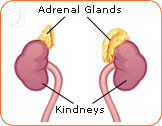Many women experience fatigue, which can be partially triggered by menopause or caused by something unrelated. Menopause symptoms such as sleeping disorders and night sweats can make it difficult for a woman to sleep, which can lead to fatigue. More than just an occasional desire to nap, fatigue is a weariness that doesn't seem to go away.
What Is Fatigue?

If you have a constant feelings of exhaustion and tiredness, you may be fatigued. This condition differs from normal sleepiness; fatigue includes a constant lack of energy, mood changes (especially feeling sad), and inability to perform your normal day-to-day tasks as usual.
Fatigue often affects both a person's physical and mental state. While the body may suffer from drowsiness and muscle fatigue, at the same time, a person may feel apathetic towards important matters, struggle to recall information, or have difficulty concentrating at work and at home.
What Causes Fatigue?

Factors that can cause fatigue include medical conditions, lifestyle factors, and emotional reasons. Underlying medical conditions that can cause fatigue include thyroid conditions, adrenal insufficiency, diabetes, or heart disease. If you have symptoms of these conditions, see a doctor to get a proper diagnose and any necessary treatment.
Lifestyle habits such as alcohol or drug dependence can also cause fatigue. If you are suffering from an addiction, it is important to seek help. An inactive lifestyle can also cause fatigue. If you are unsure of how to get the exercise that you need, talk to your doctor about an exercise regimen that could work with your lifestyle.
Stress that is not dealt with can also cause fatigue. Whether work, family, or home related, or caused by another factor, stress can take a toll on a person's mental and physical health. It is important to handle the stress in your life. This can be done by seeing a therapist, practicing meditation or yoga, or picking up a hobby or passion that helps you to release stress. Other emotional conditions - such as depression, grief, and anxiety - can also cause fatigue.
What Is the Difference between Fatigue and Chronic Fatigue Syndrome?

Very little is known about chronic fatigue syndrome, which cannot be cured with rest or alleviated with simple lifestyle changes. Many people contract chronic fatigue syndrome after a mild sickness, such as the flu or a cold. Many sufferers are unable to work or carry out everyday tasks. However, more attention is being given to this condition, so hopefully the research planned for the future will help identify better treatment plans. If you believe you are suffering from chronic fatigue, you should talk to your doctor.
More Information about Fatigue
If fatigue is lowering the quality of your life, it is important to talk to your doctor in order to get the correct diagnosis and a treatment plan that works for you. Click on the following link to learn more about treatments for menopausal fatigue.
Sources
- Better Health Channel. (2015). Fatigue. Retrieved November 5, 2015, from https://www.betterhealth.vic.gov.au/health/conditionsandtreatments/fatigue
- National Institutes of Health. (2013). Fatigue. Retrieved November 5, 2015, from https://www.nlm.nih.gov/medlineplus/ency/article/003088.htm



